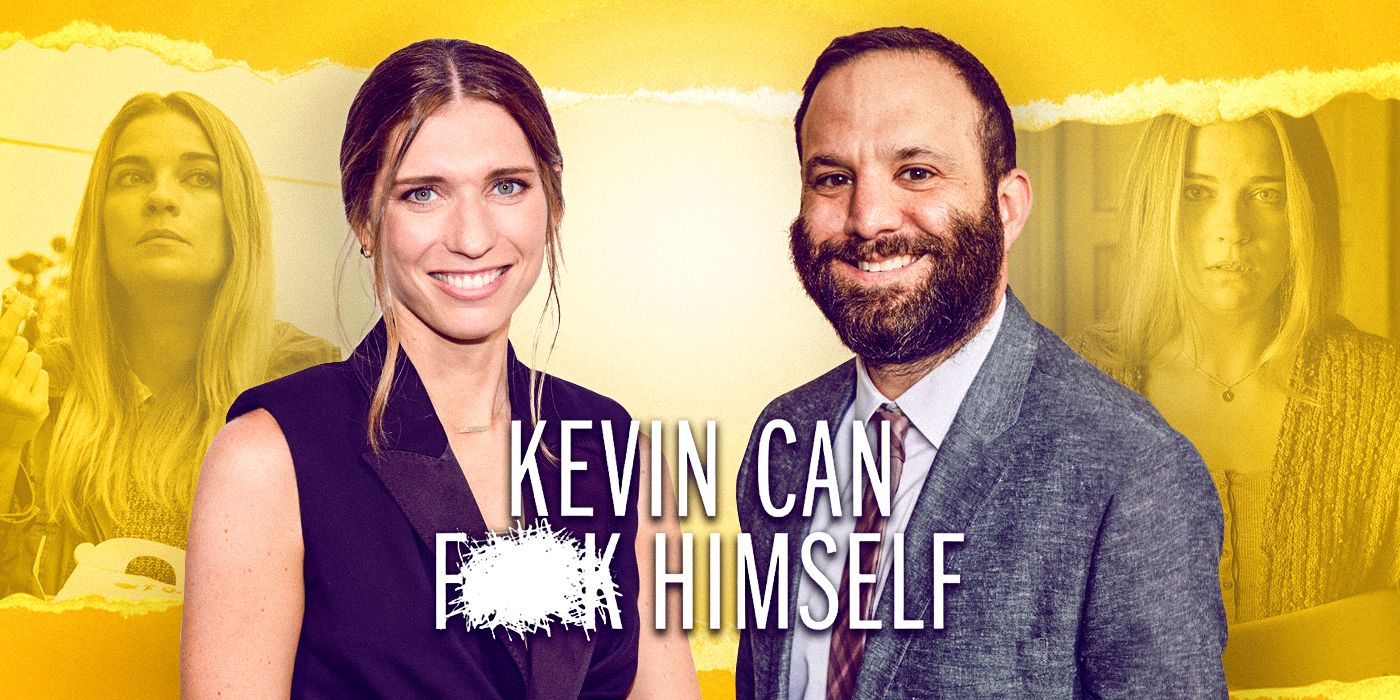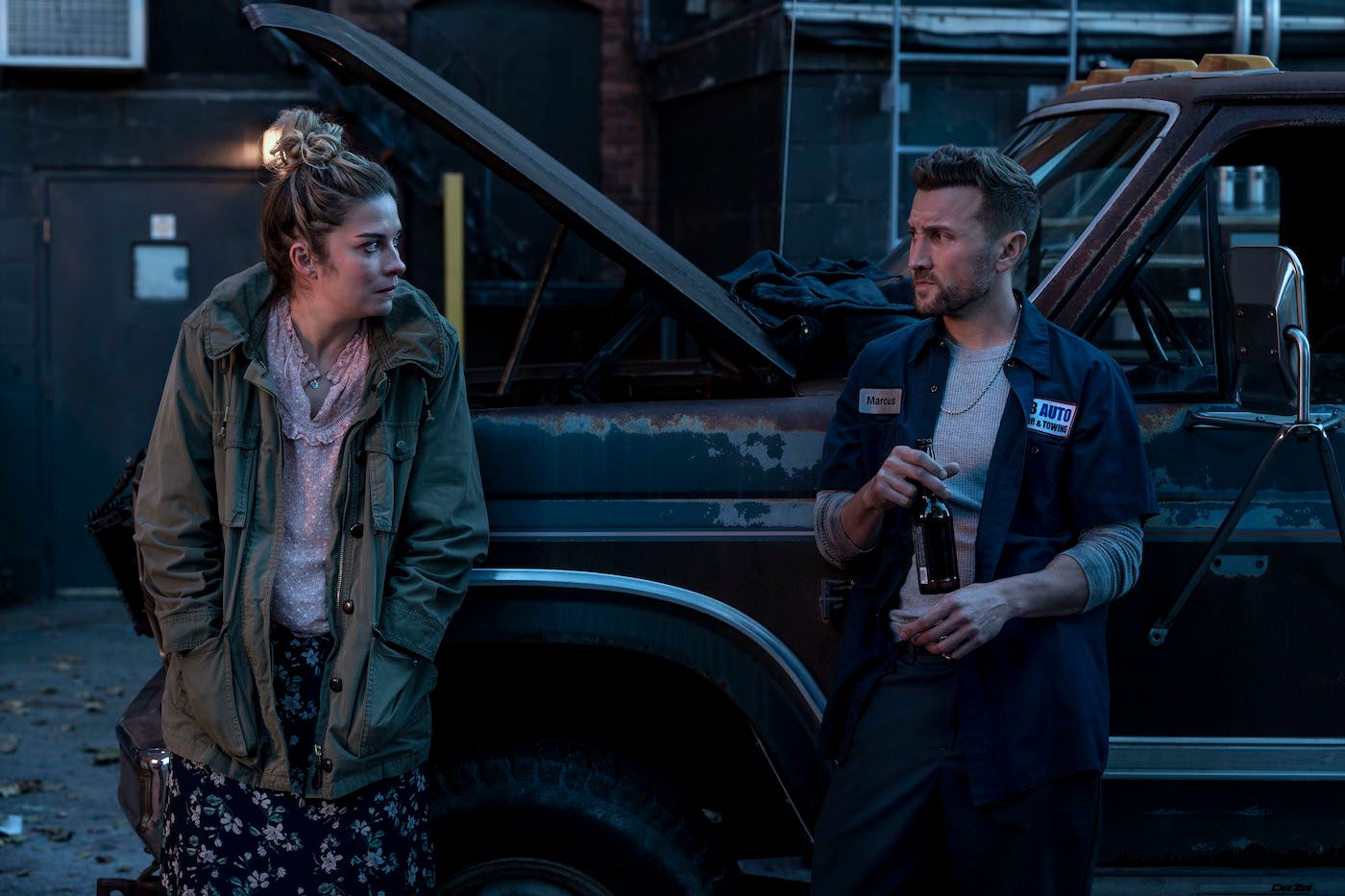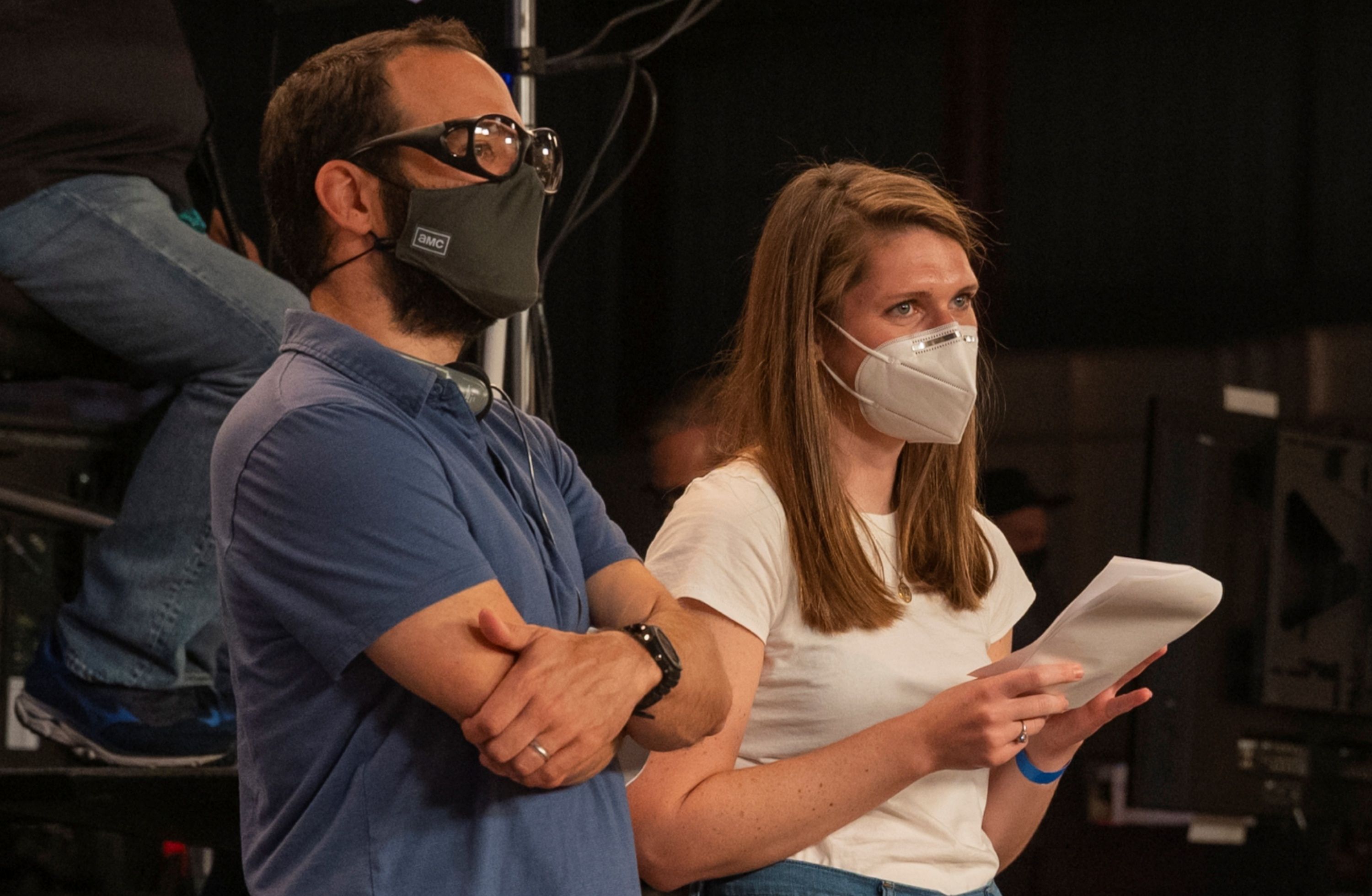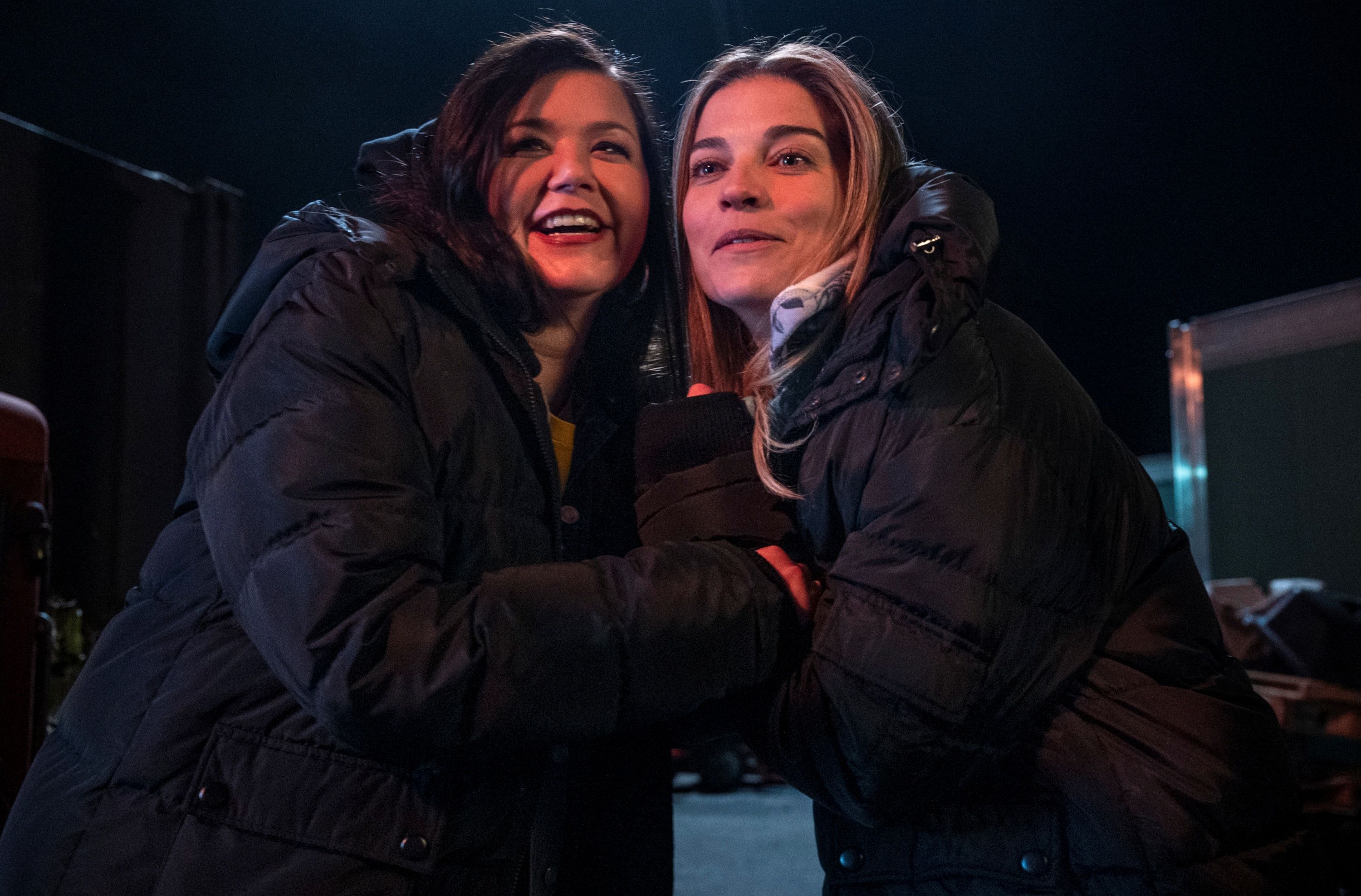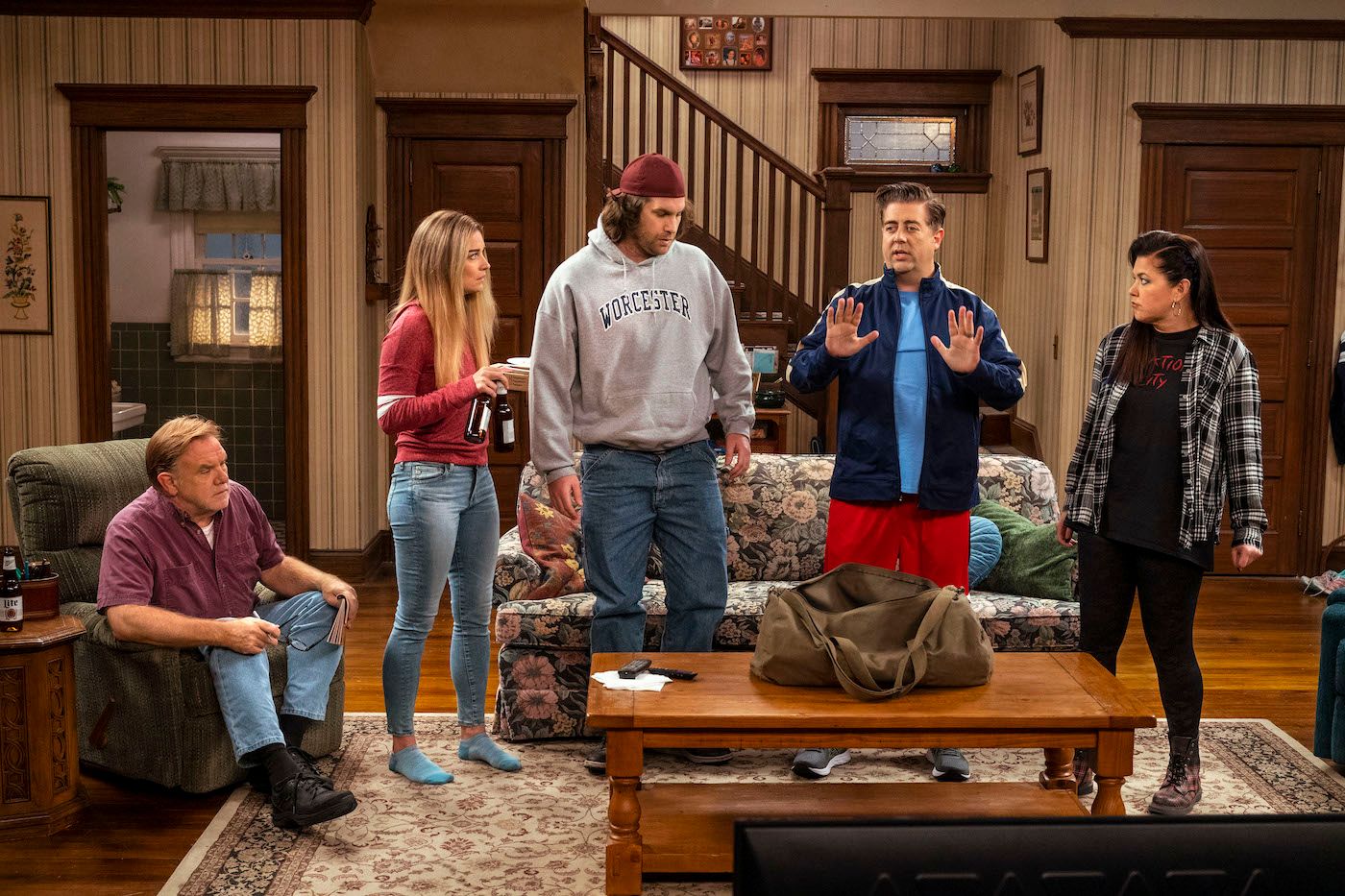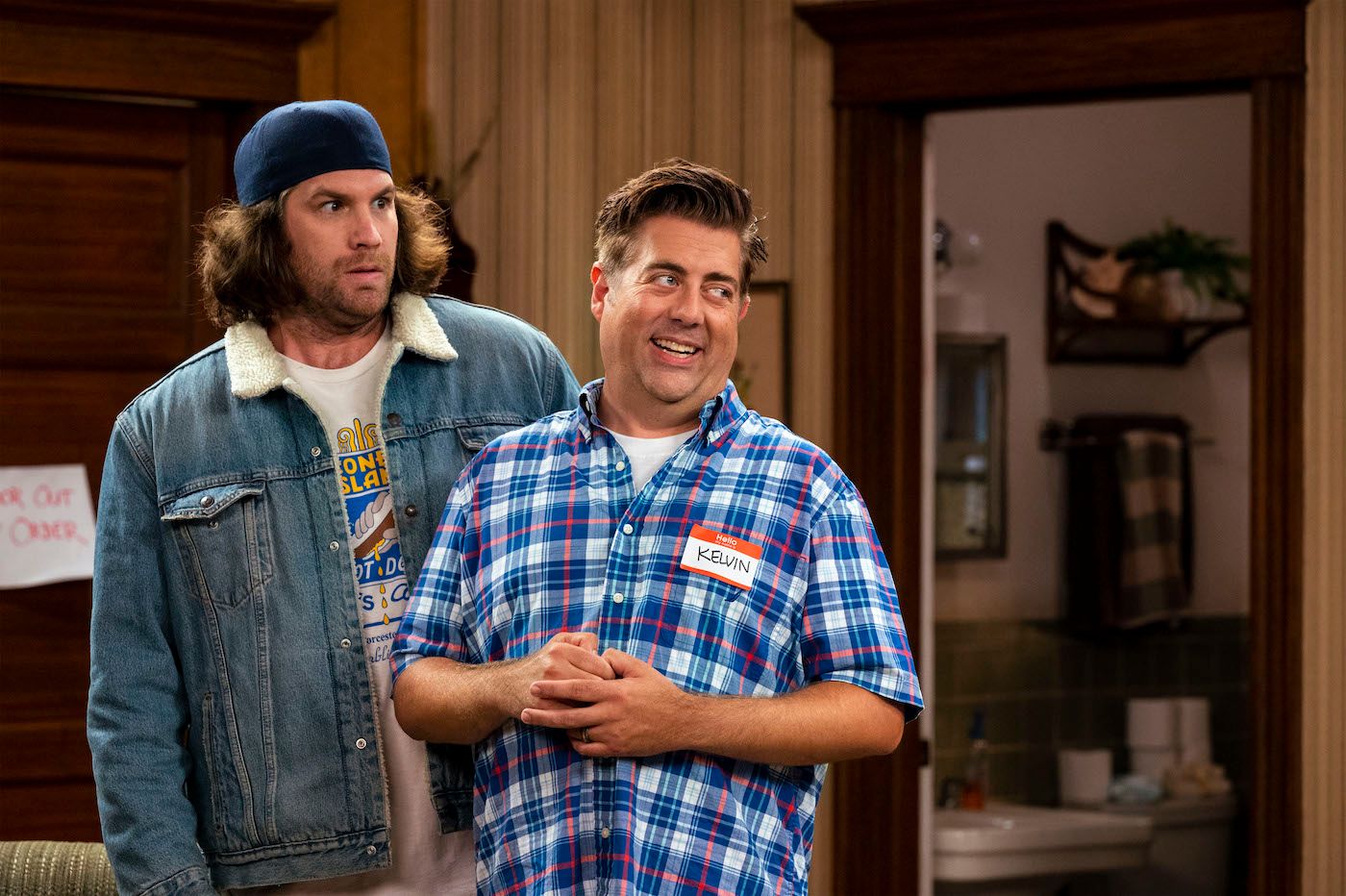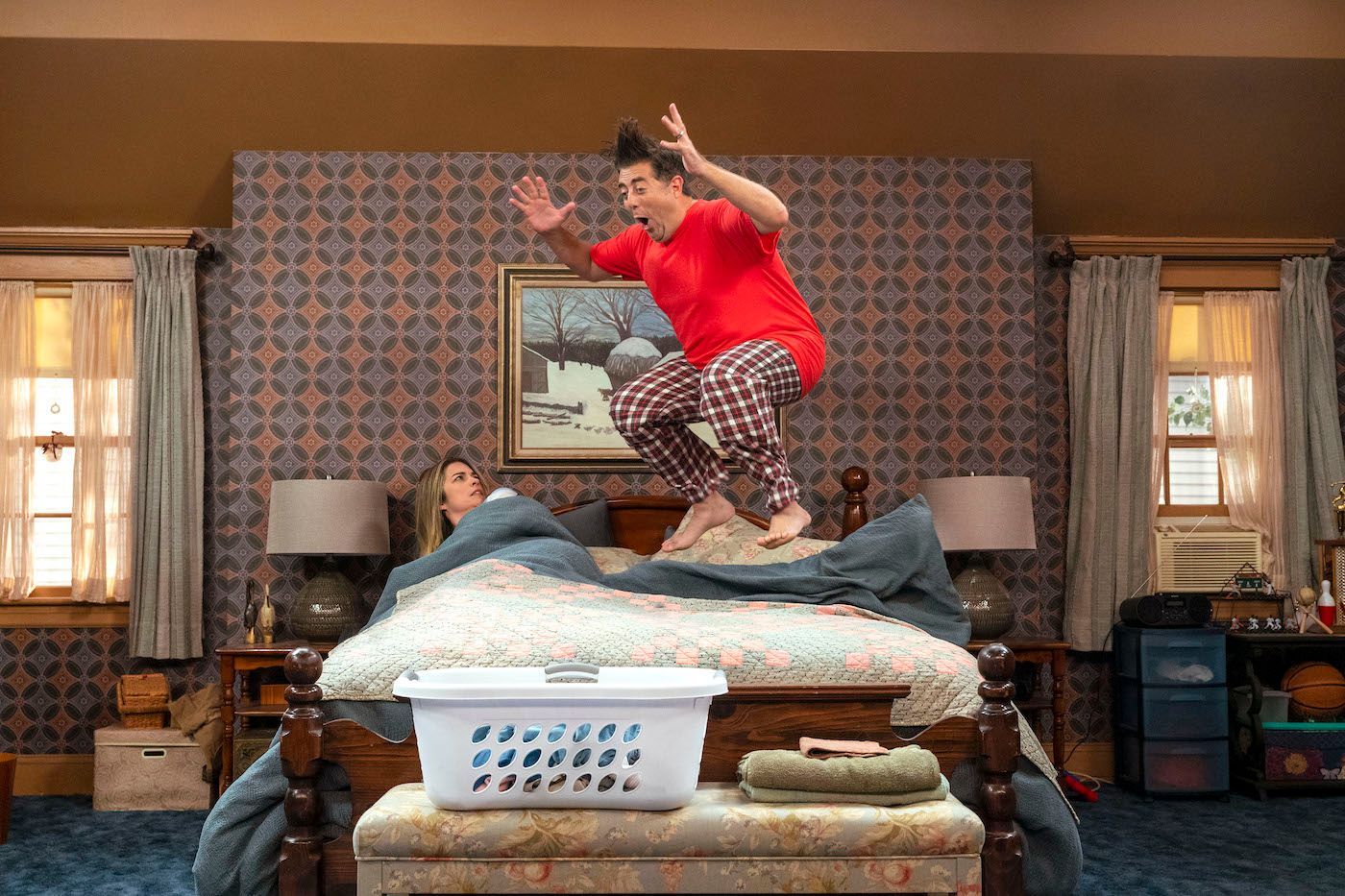From creator Valerie Armstrong (Lodge 49) and showrunner Craig DiGregorio (Shrill), the AMC dark comedy Kevin Can F**k Himself follows Allison McRoberts (Emmy Award winner Annie Murphy), a woman that finds herself unhappily married to a guy (Eric Petersen) who clearly takes her for granted. As she becomes more and more aware that her man-child husband is not going to recognize her worth, she begins to form other plans to handle the situation.
During this interview with Collider, executive producers Armstrong and DiGregorio talked about how this evolved into what it is now, the typical portrayal of the sitcom wife, how the title came about, doing a show that is part multi-cam sitcom and part gritty drama, what made Annie Murphy the perfect Allison, and what they’ve learned from finishing a season of the show.
Collider: Valerie, how did this come about? Were you sitting around and thinking like, “I need to deconstruct the trope of this sitcom wife’s situation”?
VALERIE ARMSTRONG: Kind of. First of all, I didn’t really set out to make a show. I really thought I was writing a sample that might get me staffed one day. I was an assistant, at the time. This was the summer of 2017, and I was listening to a podcast where these two women comedians were talking about pilot season and how, every year, they go out for the sitcom wife. They’re always told, “We need a really funny woman to play this. This one’s gonna be funny.” And then, they get the sides and it’s reactions, or they’re the setup machine for the men. I just got really angry. It was the summer of 2017, so I was already pretty angry. I thought, “Where is her show? Why are we watching him?” And then, that image came to me, of the first time she walks out of that sitcom living room with her sitcom husband and the sitcom laughter, and walks into the kitchen and it’s just her and her life. She’s not an actor. It’s not a show within a show. This is just a better view of a woman you thought you knew.
Why do you think it is that sitcoms really have turned into that for female characters, where the woman is overlooked and everyone just accepts it?
ARMSTRONG: Well, I think if you’re building a show around a man, which is how those shows were made for so long, everybody exists to support him. If you have the wife completely in on it, the whole time, people are gonna be looking at her and not the starring vehicle. It’s how guys saw their wives. I had one interview recently where somebody said, “And I hope women watch this and reconsider their naggy behavior sometimes.” And I said, “No. Nope. That’s not what this show is doing. That’s not at all that I meant.” I think she’s always served a very particular purpose, which was the dose of reality that the husband needed. Really, that just means that she’s always made fun of as the wet, when really, she’s the only one paying attention. She’s the only one living in the real world and she gets punished for it, over and over and over again . . . The format switch is a metaphor for a lot, but it’s also a metaphor for marriage. They always say that men get married thinking that nothing will change and their wives will stay the same, and women get married thinking that their husband is gonna change. Nothing changes in a sitcom.
When you created this, how much did you envision? Did you have a set endgame? How far ahead did you think about things?
ARMSTRONG: When I wrote the pilot, I was like, “Well, I don’t have to figure anything out. I just have to make it end well and hopefully have it be good enough that I get a job.” That was my goal for this script, but I always wanted to spend more time in this world. When it was sold off of a spec, I sat around and thought a lot about where it could go and how. The thing that made the story worth telling, to me, was realizing that it has legs, not because it matters whether or not Kevin dies. To me, it’s so lame to say, but it’s about how Allison lives. It’s actually not a story at all about a toxic marriage. It’s not about Kevin. It’s about how women can get each other out of toxic situations. And so, when I realized that I was actually breaking a story between Patty and Allison joining forces and realizing that their savior had been across the room from them for 10 years, that’s when I understood the point of the show and where I wanted it to go, ultimately. I have some plans, but we’ll see how those go.
Craig, you didn’t create the show, but you’re the showrunner of the show. How does that happen, when it’s not something you’ve created?
DiGREGORIO: I had met with AMC a little bit before this show was about to go into its mini room, which is before the first season and before you get picked up. My agents at UTA sent me this and said, “You like blending genres, so this could really be for you.” I read it and loved the script. You hear the premise and you’re like, “I don’t know, that seems pretty gimmicky.” And then, you read the script and you’re like, “Oh, no, she pulled this off.” The pilot definitely did change from that original pilot, but even from its outset, you could tell there was something behind it all. There was a true voice and viewpoint behind it all, and that made it much harder to dismiss it as just a gimmick. So then, I met Valerie and we got along really well. This type of working relationship is a lot like a marriage. There’s a lot of stuff to talk about. Thankfully, we have extremely similar tastes, but we’re also not afraid to talk to each other, if we disagree. We have a very easy line of communication, where if we disagree about something, we talk about it. We both wanna do what’s best for the show. Although I didn’t create it and she’s not showrunning it, it’s the perfect thing. I feel we both make the show that much better for having checks and balances on each other and talking about things so much. It’s a bit of a weird position sometimes. You hear that these sorts of relationships can go south very quickly, but it really is just having the best interest of the show at heart. I don’t have an ego about anything, nor does she. The best idea, whether it comes from her or me, or someone on staff, or someone walking by that we just happen to overhear. It’s never a thing like, “I need my hand in this, all the time.” I just wanna put out the best show.
Did you have a grasp on what this would be, from the beginning? Was it something that took time to figure out?
DiGREGORIO: From the outset, Valerie and I talked about ways to do this and ways to make both worlds. Tonally, you have to be sure that both things are exactly what you want them to be, in order for the transitions to work, from multi-cam to single-cam. For that transition to work, you have to really be sure that you’re sticking to exactly what would happen in a multi-cam and going straight at the reality of people’s lives in a single cam.
Valerie, it’s so interesting that you also have SEAL Team on Lodge 49 as credits. How did you get from there to here? Was there anything you learned on either or both of those projects that you feel influenced what you’re doing now, in any way?
ARMSTRONG: SEAL Team was very interesting as a first staff job. I was the writers’ assistant there and they promoted me, and I’m forever grateful. I think I was their 16th writer, and I had never been in a room that big in my life, but when you have 22 episodes to produce a year, you need a lot of bodies. I remember there were actual Navy SEALs, who would be in the writers’ room. One, I was sort of friends with, and I was working on this script that day at work and I printed it out, so that I could hard copy edit it. He looked at it and took it and I said, “What are you doing?” And he said, “I’m gonna read this, this weekend.” And I said, “No, it’s not ready.” And he said, “I don’t care.” And so, he took it. And then, on Monday morning, he sat down next to me and slowly slid the script back to me and said, “You have a lot of anger.” And I was like, “Yeah, Navy SEAL. Be scared of me.” From that job, I learned a lot about male-female dynamics. Being in a writers’ room with those guys, they saw me in a very specific way and I was really non-threatening to them. They felt like they could tell me a lot, but it also meant that sometimes I shocked them that I had true emotions. And then, on Lodge 49, I really appreciated how real that world felt. We have the same costume designer, Carol Cutshall. I thought she did such an amazing job of making these people who were supposed to be blue-collar, or at least not white collar, all look so genuine. What I wanted from this world, more than anything, is to accurately show the people I grew up with and the places that I grew up. I think Lodge 49 and that sense of place of Long Beach did what I hope we did for Worcester.
How did the title for the series come about? Was the character’s name always Kevin, or were there other names you considered?
ARMSTRONG: Yes, there was a moment when his name was Randy. I just needed a working title. I was an assistant and I had horrible imposter syndrome. Every working document on my desktop had to have a title that made me not hate looking at it and think, “Who do you think you are?” So, it had to make me laugh, and Kevin Can Fuck Himself always made me laugh. It’s been four years. It really could have changed a few times, but it’s had a lot of support from the network, and I like it, not at all because it references a sitcom that hasn’t been on the air for years now. I like it because to me the format switch is in the title. It starts out sounding like something familiar, and then things change and it gets a little weird and dark. It’s a good primer for, “Right, it’s not actually about Kevin. It looks like it is, but it’s not.”
What was the most surprising thing, in seeing all of this brought to life and seeing the two different types of shows, with the sitcom and the gritty drama, and seeing what the actors did with the characters and those relationships. What most surprised you, in seeing it come to life?
ARMSTRONG: I always saw the format switch in my head and it always worked there, but I was pretty terrified, when we started shooting it. If any show should have had a pilot, it should have been this one, but I’m thrilled that AMC took the chance that they did on it. Everybody is so wonderful at their jobs on this crew. I tried my best to really explain what I had in mind, and then trust them that they knew how to do it better than I did. I don’t know how to do anybody else’s job. I do this job, not costume design and not set design. I do this and trusted them that they could do theirs, and everyone absolutely did. And the actors, I continuously marvel at Annie [Murphy] and Mary Hollis Inboden, who plays Patty, and their ability to play the same character in these very, very different worlds. It’s all reality, but the cadence of the multi-cam is so different than the grounded, small comedy character-driven stuff that they do on the other side. What I was so surprised by and just grateful for is that I pictured it in my head for four years and what everybody made together was better. It was better than I ever saw it in my head.
Was there also a lot more time spent on thinking about how things would look in both worlds, so that they’re visually different and the coloring is different?
DiGREGORIO: Yeah. Thankfully, from the multi-cam world, we’re taking from a very long line of things that exist. In order to do a commentary on it, you have to do the real thing, so we made sure that the multi-cam part of the show looked like a real multi-cam sitcom and played like a real multi-cam sitcom. Otherwise, the commentary would fall flat. If you’re just doing a parody of it, no one’s gonna care what you really have to say about it.
I was reading that you shoot the sitcom parts of the episodes, and then you shoot the single cam stuff separately. Does it feel like you’re essentially shooting a sitcom and a gritty drama, at the same time? Does it feel like you’re making two shows?
DiGREGORIO: Yes. It’s crazy and it’s hard and it’s a lot of work. It was a lot of work during a pandemic when it was exponentially harder to do anything. It also helps you, by separating them and shooting them separately, and having our multi-cam days where we would do tape nights, like we would on a real multi-cam, and we had a tiny audience because of COVID. It’s also a nice reminder of what you’re doing. If we had blended them together, those tones may have shifted a tiny bit. It’s very hard to get out real emotion in a multi-cam scene. You can, but that’s not really where that type of comedy lives. It was helpful to the show because we really got to look at each piece as its own.
What was it like to have that audience there, however small it was? Were there times when you’d do a scene and think it would be really funny, but no one laughed?
DiGREGORIO: That’s the question on all multi-cams. Thankfully, we were on set, so if something didn’t get the response we wanted, we would rewrite it on set. We’d have a document of all the jokes from the rest of the staff that we would bring. It’s much like being on any set like that, or even a single cam comedy. If something doesn’t work, you’re shifting jokes on the fly. Because everything is so inextricably tied together, we couldn’t really change story points ever, nor did we want to. We thought the way we were telling the stories was working, and that the way the multi-cam and single camera inform upon each other was working. If something didn’t work in front of the audience, we would punch up jokes of change blocking, or things like that, to get across what we wanted. It was never straight up huge rewrites on set, like you sometimes get on multi-cam shows.
This show really plays with that question of what reality is. Are we supposed to be watching this with the idea that the single camera sequences are the real world, or could the characters real reality be the multi-cam world, or are we not supposed to be separating it in that way?
DiGREGORIO: It is all a hundred percent real. It’s in nobody’s head. The visual switch is just that. It’s a visual device to show you that when Kevin, or people like him, are on screen we get the benefit of the doubt and have people propping them up who aren’t necessarily funny, but we’ve been taught to laugh at. So, when they’re on the screen, it’s a multi-cam because it’s their show. Whenever Kevin is around, he’s larger than life. It’s his show. And when you’re with Allison or Patty, and there are other characters that are in the single-cam as well, and they don’t have that person to take over the scene, it’s their life and it’s shot in a much more realistic way. So, it’s all real. The switch is a visual device that we’re using to show who’s getting the benefit of the doubt.
It seems like this is one of those shows that either works or doesn’t work, depending on how you feel about Allison. Valerie, having lived with that character for awhile, what was it like to see Annie Murphy step into that role? Was she anything like you had pictured the character to be?
ARMSTRONG: It was tough because I always saw her and had known her as Alexis. Like everybody else, I watched Schitt’s Creek, and in my head, that character and this character are completely different. But then, I met Annie, who is not at all Alexis, and she’s not at all Allison either. I always had an image of Allison in my head. I never got too attached to anything or anyone’s voice. Truly, what happened when I met Annie was a giant sigh of relief because we always said that Allison needed to be able to play frustrated as funny. We never wanted that single-camera side of the show to be dour or hard to go back to, and Annie can do that perfectly. Everything I asked her to do, she did, basically in one take. I would say, “Well, I feel bad at my job because I have no other notes, so thank you.” She can do everything.
I can’t imagine anyone else taking on the role of Allison. Craig, what made Annie Murphy the perfect person to be at the center of this story and to follow all of these ups and downs with?
DiGREGORIO: Really, it’s because she does both drama and comedy effortlessly. She’s given the unenviable role in the multi-cam and still manages to find the moments where you wanna be with her all the time. And then, in the single-camera, she’s so effortlessly good and funny, but also everything she’s doing, and she has some very heavy, dramatic scenes, they never feel dour or that they’re being done by someone who wants to act. She just does everything so naturally and effortlessly that she was perfect for it. The one thing we talked about a lot, going into casting, was finding someone who played frustrated as funny, as opposed to dour and put upon, and she does that so well. Every moment that things are piling up on her, you’re not like, “Oh, she gonna just break down.” She’s doing something that you wanna watch. She’s wonderful. She really is. Plus, she’s a wonderful person. That made it all the better.
How serious is Allison about killing her husband?
DiGREGORIO: She’s very serious. She probably believes she’s more serious than she actually is, but I don’t know if that’s even true. She is very serious and it’s truly the first time in a long time that she’s taken action to do something, as opposed to letting all of these things that are happening around her pile on. So, in that way, she’s very serious about her task, but through this task, the important thing is that she’s learning so much more about herself. The real question of the show, for us at least, isn’t about whether or not she loves Kevin. It’s about the relationships she’s forming and the things she’s learning, as we go through the season.
I also love that this show really does address the question of, why doesn’t she just leave? Clearly murder is not the best option, but at the same time, it’s really hard to just leave your life behind. Was it important to you, to just address that head-on in the show?
ARMSTRONG: Oh, yeah, absolutely. It’s not like I was trying to be like, “Well, she can’t leave because she has a flat tire.” I didn’t wanna just make up an excuse. That’s not why I wanted to address it. I wanted to address it because it was something that people had brought up to me, when talking about this series. I always got really upset because I feel like it’s so dismissive and comes from such a place of privilege to say, “Just leave.” There are people in my life who can’t afford to get divorced, so they’re stuck in the same house under the same roof and they’re miserable. Like in Big Little Lies, Nicole Kidman’s character has the hardest time leaving, and she has the income to have a completely stocked apartment to go to. How is someone like Allison, who has $147 to her name, supposed to do something like that?
DiGREGORIO: That scene is in there because we kept getting that question and because we kept saying to each other, “It’s not that easy. Why do people keep saying this? Why do people keep saying, just wait? Where is she gonna go, and with what money? What is happening that people think it’s so easy to just walk away from your life? It’s not. We kept getting that question, and I think that question also comes from a point of being able to leave. It was coming from, “Well, if my husband did this, I would just leave.” And okay, you would, but there are a lot of people who couldn’t. So, it became something we really wanted to tackle head-on. That’s why that scene is in there. I remember, early on, talking about it because it’s so much easier to just say it, and to say it veiled in this book that she’s writing. It’s hard for her, and it would be hard for almost everyone, to just walk away from something. I can barely get out of bed in the morning.
Is it hard not to break Allison and Kevin up too soon, so that you still have a show?
ARMSTRONG: What was super important to me, in making the show, is that everyone always says, “How is she with him?” When you see the billboard for these sitcoms, everyone is like, “She’s with him? Yeah, right.” And I wanted to be like, “No, this is why.” I wanted to make her a real person and explain how that woman ended up there, which is very difficult. To me, it’s about her. It’s in her self-worth. It’s how things have changed over 10 years and how her perspective on that guy has changed. It’s a lot about co-dependence. She gets something out of that relationship too. She gets something out of cleaning up his mess and being needed. It’s just when she realizes that there’s real intent in keeping her there and keeping these things at her expense, that’s when things start to change for her. So, I completely understand how that woman is still there and how she got there. We also weirdly talked a lot about Succession and how little bits of people’s paths are sprinkled in throughout, and they reveal giant swaths about who these characters are. We wanted to do that with Allison. In Episode 4, she just mentions that her dad was a cop. It’s not a whole scene. She just mentions it. I think that tells you a lot about who she is too. So, finding those moments to remind people that this is who she is and this is how she got here, was fun to figure out.
What do you feel you’ve learned from making a season of the show that you think could affect a second season? Does a show like this get easier with each season, or are there just always new challenges?
DiGREGORIO: There are always new challenges, but we certainly have learned the strengths of each character. Not of each actor, but of each character and what they actually really wanna do and how they would act in every specific circumstance. And we learned just how these interactions should go, to make them the most interesting. We never just wanna have a scene of two people sitting there and talking without some spin on it. We learned just how well all of these people work together, what their wheelhouse is for what they enjoy doing on screen, and what they bring to the character – extra little things that we never would have thought of. All of a sudden, all of these people brought so much to their characters that it made it a lot easier to write, at the end of the day.
Kevin Can F**k Himself airs on Sunday nights on AMC.

